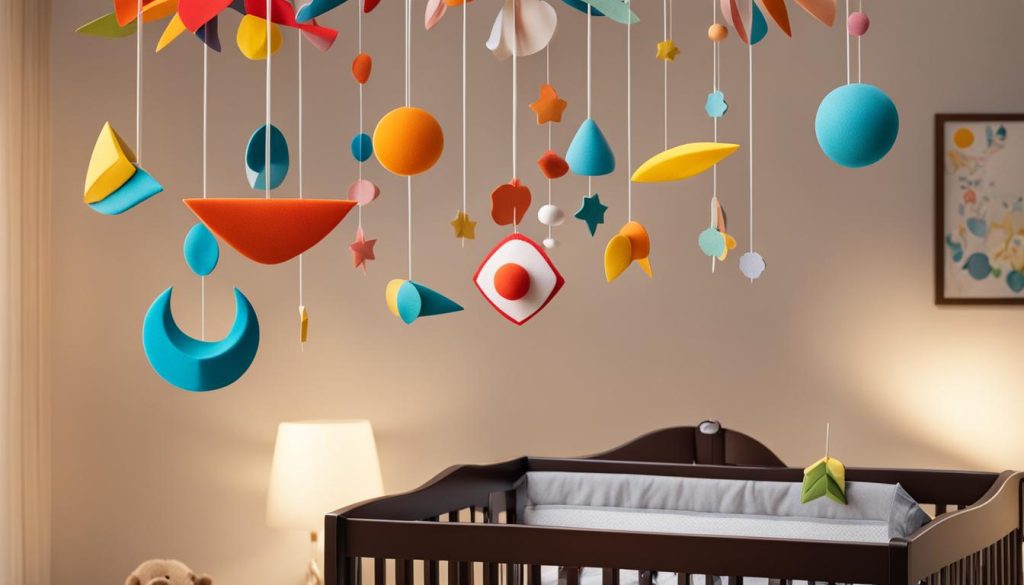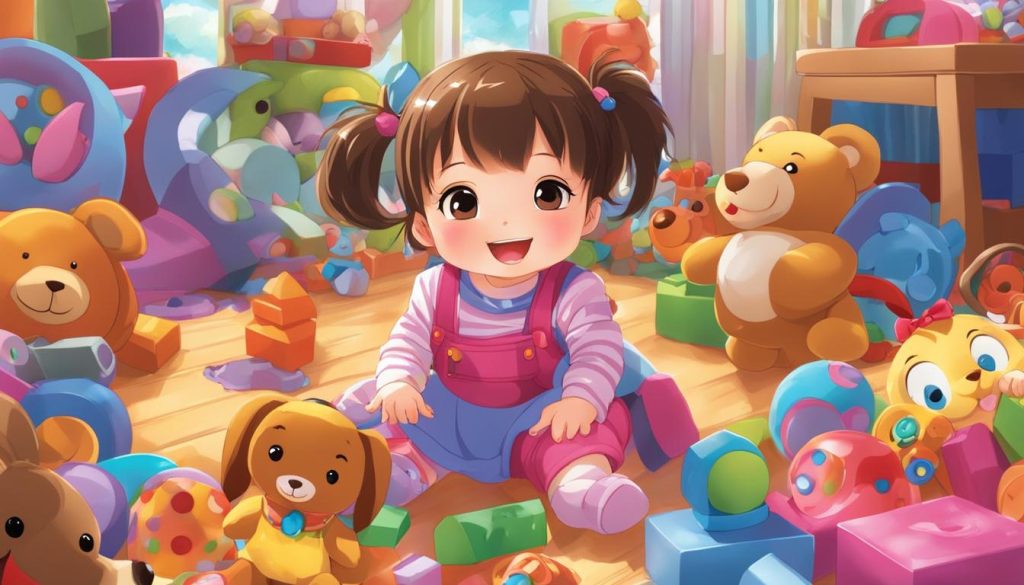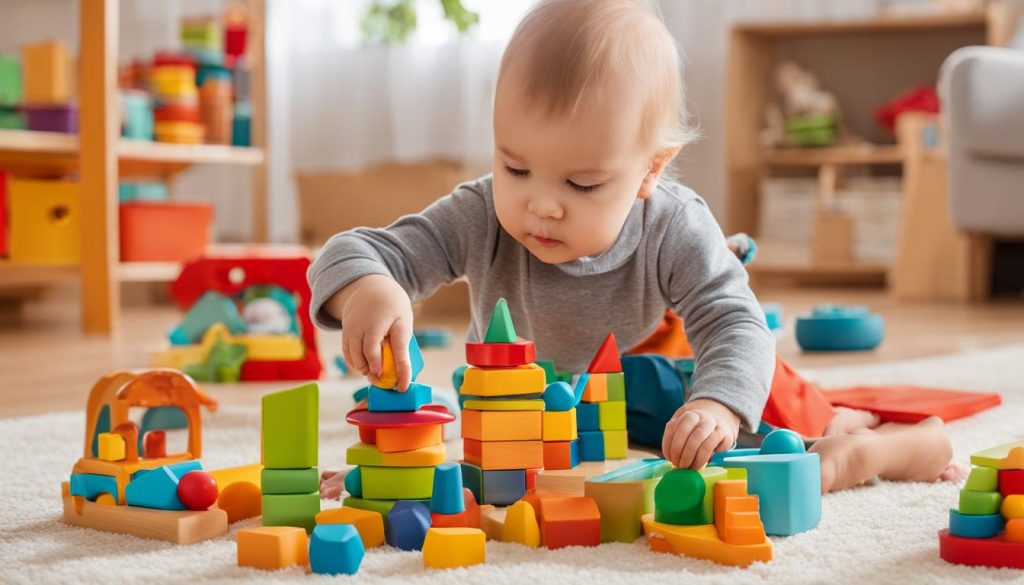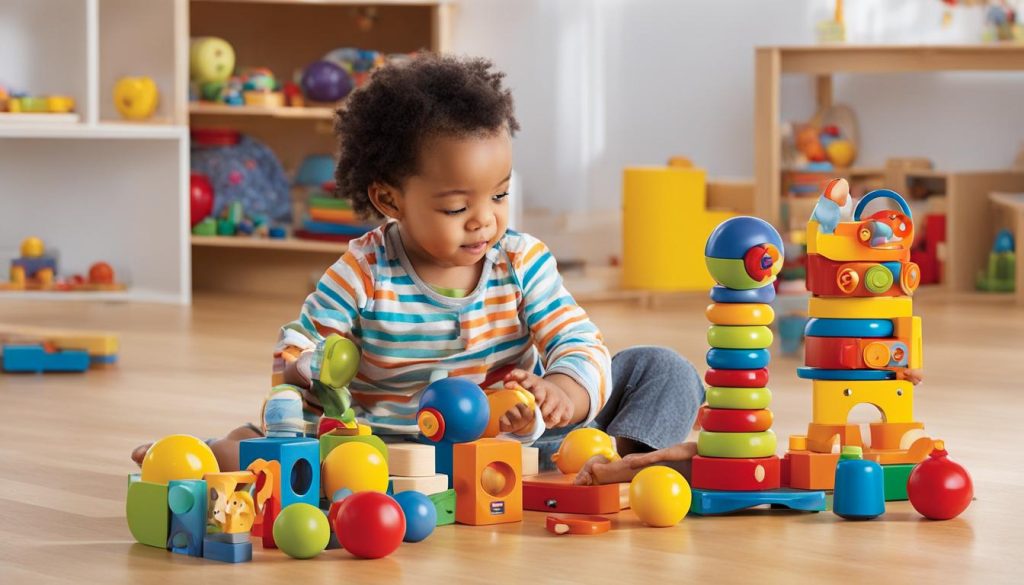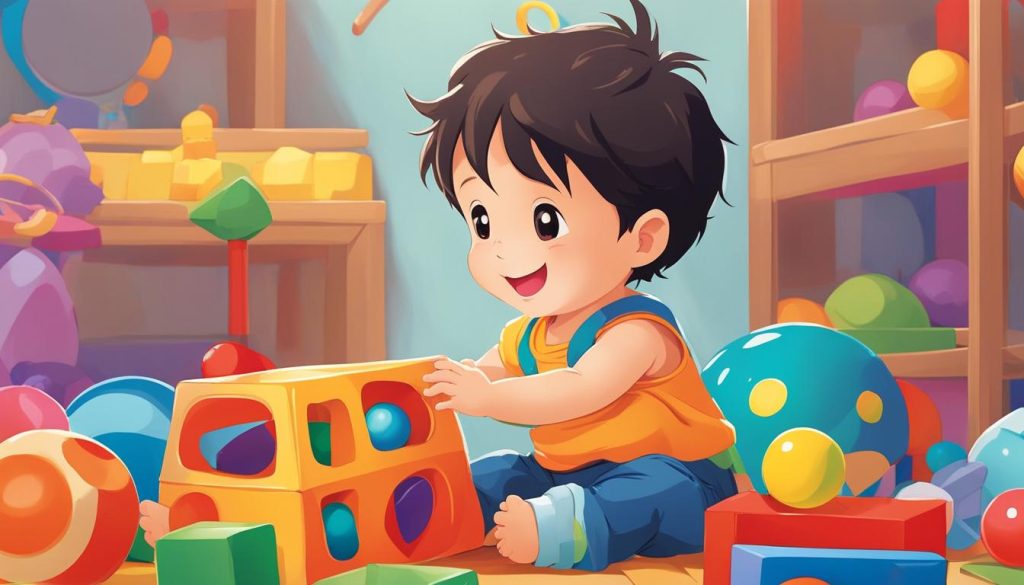Developmentally appropriate toys can support the early cognitive and motor skill development of newborn babies. Sensory stimulation plays a crucial role in their exploration of the world, and toys with textures, colors, patterns, and sounds can help develop their senses. Selecting the best toys for infants involves considering expert recommendations, toy safety guidelines, and the preferences of parents and caregivers. This article aims to provide a comprehensive guide to the most engaging and safe toys for newborn babies.
Expert-Recommended Educational Toys for Newborns
When it comes to selecting toys for newborns, experts emphasize the importance of choosing educational options that foster cognitive development and sensory awareness. These toys engage newborns’ senses and promote their early learning experiences. Here are some expert-recommended educational toys for newborns:
Puzzles:
Puzzles designed for newborns feature large, colorful pieces that are easy for little hands to grasp. They help develop problem-solving skills and hand-eye coordination. Melissa & Doug’s Large Farm Jumbo Knob Puzzle is a popular choice for its vibrant artwork and chunky knobs that make it easy for babies to manipulate the pieces.
Rattles:
Rattles are not only fun toys for newborns but also contribute to their sensory development. They stimulate babies’ auditory senses and encourage them to explore cause-and-effect relationships. Fisher-Price’s Rock-a-Stack Bat-at Ring-Stacking Toy is a beloved option that offers multiple items to grasp, shake, and stack.
Teething Toys:
As babies begin to teethe, toys that soothe their gums become essential. Teething toys not only provide relief but also aid in the development of fine motor skills. Manhattan Toy’s Winkel Rattle & Sensory Teether Toy is a versatile choice with its multiple textures and vibrant colors, offering a delightful sensory experience for newborns.
These educational toys for newborns provide engaging and developmentally appropriate experiences that promote their cognitive growth and sensory exploration. It is important to choose toys that are safe, age-appropriate, and recommended by experts to ensure the utmost care for your newborn’s growth and development.
Sensory Toys for Newborns
Sensory toys play a crucial role in newborns’ early development. These toys are designed to stimulate their senses and promote cognitive and motor skill development. By engaging with different textures, sounds, and visual features, newborns can actively explore and understand their environment.
Here are some examples of sensory toys for newborns:
- Lovevery The Charmer Play Kit: This play kit includes a variety of sensory toys, such as a soft blanket, wooden rattle, and textured cards. It provides newborns with opportunities to engage their senses and develop their cognitive and motor skills.
- Baby Einstein 4-in-1 Kickin’ Tunes Music and Language Discovery Activity Play Gym: This activity play gym features various toys, including a mirror, hanging toys, and a musical keyboard. It encourages newborns to reach, grasp, and explore different sounds and textures.
- Fisher-Price Busy Buddies Gift Set: This gift set includes a plush toy with textures, a rattle, and a teether. It offers newborns a variety of sensory experiences to engage their senses and promote their early development.
These sensory toys provide infants with the necessary stimuli to enhance their cognitive and sensory development. They can help newborns develop their fine motor skills, hand-eye coordination, and overall sensory awareness.
| Sensory Toys for Newborns | Features |
|---|---|
| Lovevery The Charmer Play Kit | Includes a variety of sensory toys such as blankets, rattles, and textured cards |
| Baby Einstein 4-in-1 Kickin’ Tunes Music and Language Discovery Activity Play Gym | Offers a mirror, hanging toys, and a musical keyboard to stimulate newborns’ senses |
| Fisher-Price Busy Buddies Gift Set | Features a plush toy with textures, a rattle, and a teether for sensory exploration |
Introducing sensory toys into a newborn’s playtime routine can provide a rich sensory experience and promote their early learning. These toys offer a safe and stimulating way for newborns to engage with their environment and develop their cognitive and motor skills. Remember to choose toys that are age-appropriate and safe for newborns to ensure their well-being during playtime.
Developmental Toys for Newborns
Choosing the right developmental toys for newborns is essential for promoting their overall growth and learning. These toys are specifically designed to stimulate different aspects of development, such as social awareness, fine motor skills, and language development. By providing infants with age-appropriate toys that cater to their specific developmental needs, we can support their cognitive, physical, and emotional development in the early stages of life.
Table: Top Developmental Toys for Newborns
| Toy | Description |
|---|---|
| Lovevery’s Charmer Play Kit | A comprehensive kit that includes multiple age-appropriate toys and a developmental guide to support infants’ growth and learning. |
| Vulli Sophie La Girafe Teething Toy | A popular teething toy that stimulates sensory exploration and provides relief for teething infants. |
| The First Years Stack Up Cup Toys | A set of colorful stacking cups that help develop fine motor skills and hand-eye coordination. |
| Verywell Family’s Black & White Card Set | A set of high-contrast cards that promote visual stimulation and cognitive development in newborns. |
These top developmental toys for newborns offer engaging experiences that encourage exploration, learning, and skill development. However, it’s important to remember that every child is unique, and their preferences may vary. Parents and caregivers should observe their newborns’ reactions to different toys and adjust their selection accordingly. Additionally, always ensure that the toys chosen for newborns are safe, free from small parts that could pose choking hazards, and made with non-toxic materials.
Best Toys for Newborns Based on Age
Choosing the best toys for newborns involves considering their age and developmental stage. As newborns begin to explore their surroundings, their preferences and abilities change over time. Providing toys that are tailored to their age and developmental milestones can enhance their learning and engagement. Here are some recommendations for the best toys for newborns based on age:
Age: Newborn
At this stage, newborns are just starting to discover the world around them. They are attracted to high-contrast colors and different textures. Soft and grabbable toys, such as plush rattles or textured fabric books, are great choices. These toys stimulate their senses and encourage reaching and grasping movements.
Age: 2-3 Months
As newborns reach the 2-3 month mark, they develop better hand-eye coordination and the ability to grasp objects. Toys that encourage interaction, such as sensory gyms with hanging toys and rattles, are ideal. These toys allow newborns to explore different sounds, textures, and movements, promoting sensory and motor skill development.
Age: 4-7 Months
Between 4-7 months, newborns start teething and have a heightened curiosity about their environment. Teething toys that are safe to chew on and have different textures can provide relief and stimulate their senses. Toys with movable parts, such as activity cubes or soft books with flaps, are also engaging options at this stage.
Age: 7-12 Months
As newborns approach their first birthday, they are likely to become more mobile and interested in crawling and walking. Toys that encourage crawling, such as rolling toys or push-along walkers, can support their physical development. Stacking cups or shape sorters also promote problem-solving skills and hand-eye coordination.
| Age | Recommended Toys |
|---|---|
| Newborn | Plush rattles, textured fabric books |
| 2-3 Months | Sensory gyms, rattles |
| 4-7 Months | Teething toys, activity cubes, soft books with flaps |
| 7-12 Months | Rolling toys, push-along walkers, stacking cups, shape sorters |
“Providing toys that are tailored to a newborn’s age and developmental stage can enhance their learning and engagement.”
It’s important to remember that every newborn is unique, and their development may vary. These recommendations serve as a general guide, but it’s essential to observe your baby’s interests and abilities to choose the most suitable toys. By selecting age-appropriate toys, you can foster their curiosity, promote their developmental milestones, and create a stimulating environment for their early learning journey.
Importance of Choosing Age-Appropriate Toys
When selecting toys for newborns, it is essential to prioritize their safety and choose age-appropriate options that align with their developmental stages. Age-appropriate toys not only ensure the well-being of newborns but also play a significant role in promoting their overall development. Plush toys are particularly popular and safe choices for newborns due to their softness and lack of small detachable parts, reducing the risk of choking hazards.
Toys that match a newborn’s developmental stage provide them with the right level of challenge and stimulation. For example, during the first few months, newborns are attracted to high-contrast colors and textures. Soft and grabbable toys can help stimulate their senses and aid in the development of their fine motor skills. Interactive toys that make sounds or have different textures can also enhance newborns’ sensory exploration, fostering cognitive and motor skill development.
“Choosing age-appropriate toys for newborns is crucial to ensure their safety and promote optimal development. Soft and plush toys are generally safe choices for newborns as they are easy to grasp and do not have small detachable parts.”
By providing newborns with toys that match their developmental needs, parents and caregivers create a supportive play environment that encourages growth in various areas, including cognitive, physical, and emotional development. Understanding the importance of age-appropriate toys helps ensure that newborns receive the most benefit from their playtime, setting a foundation for future learning and exploration.
| Benefits of Age-Appropriate Toys for Newborns |
|---|
| Ensures safety and reduces choking hazards |
| Fosters cognitive and motor skill development |
| Stimulates sensory exploration |
| Aids in the development of fine motor skills |
| Promotes a supportive play environment |
| Encourages overall growth and learning |
Understanding the Impact of Play on Early Childhood
Expert opinions and research studies have consistently highlighted the significant impact of educational play on early childhood development. Engaging in play with educational toys not only brings joy and fun to children but also serves as a powerful tool in facilitating their cognitive, physical, and emotional growth.
“Play is the highest form of research.” – Albert Einstein
When children engage in play, they actively explore and understand their environment, enhancing their problem-solving abilities, creativity, language development, and social interaction skills. Play provides children with opportunities to think critically, make decisions, and learn through trial and error. It stimulates their curiosity, imagination, and resourcefulness, paving the way for a lifelong love of learning.
According to Dr. Amanda Smith, a renowned child psychologist, “Educational play not only promotes the development of specific skills but also fosters a sense of independence, self-confidence, and resilience in children. It empowers them to take charge of their own learning journey and builds a solid foundation for future academic success.”
Benefits of Educational Play in Early Childhood:
- Enhances problem-solving skills and critical thinking abilities
- Encourages creativity, imagination, and resourcefulness
- Promotes language development and communication skills
- Facilitates social interaction and cooperation
- Develops fine and gross motor skills
- Builds self-confidence and resilience
- Instills a love for learning and curiosity
Creating a Supportive Play Environment:
In order to maximize the benefits of educational play, it is essential for parents and caregivers to provide a supportive play environment for children. This involves:
- Offering a variety of age-appropriate toys and materials that cater to different developmental needs
- Encouraging open-ended play that allows children to explore and experiment
- Providing ample time and space for unstructured play
- Participating in play activities and engaging in meaningful interactions with children
- Creating a safe and secure environment that allows for risk-taking and learning from mistakes
By recognizing the significant impact of educational play and actively fostering a supportive play environment, parents and caregivers can help children thrive and reach their full potential during these critical early years of development.
Conclusion
As a professional copywriting journalist, I have highlighted the importance of choosing the right toys for newborn babies. These toys play a crucial role in supporting their cognitive, physical, and emotional development. By considering their specific developmental needs and selecting age-appropriate toys, parents and caregivers can create a supportive learning environment for growing babies.
Throughout this article, I have discussed various types of toys that cater to the toy needs of growing babies. Whether it’s educational toys, sensory toys, or developmental toys, each category offers unique benefits for newborns. From puzzles and rattles to teething toys and sensory gyms, these toys stimulate their senses, promote motor skill development, and encourage early learning.
It is important to note that safety should always be a priority when choosing toys for newborns. Opting for toys that are designed for their age group and avoiding small detachable parts can ensure their well-being. Additionally, plush toys are generally safe choices for newborns as they offer easy grasping and minimize the risk of choking hazards.
By considering expert recommendations, toy safety guidelines, and the preferences of both parents and caregivers, we can provide newborns with the best toys that foster their growth and learning. Through play, newborn babies can actively engage with their environment, acquiring essential skills such as problem-solving, creativity, and social interaction. Let’s make the journey of learning a joyous one for our little ones by selecting the right toys that meet their specific toy needs.
FAQ
What types of toys are recommended for newborns?
Experts recommend educational toys, sensory toys, and developmental toys for newborns to aid in their early development.
What are sensory toys and why are they important for newborns?
Sensory toys are toys that stimulate newborns’ senses through different textures, sounds, and visual features. They help newborns explore the world around them and promote cognitive and motor skill development.
What are developmental toys and how do they benefit newborns?
Developmental toys are designed to support newborns’ growth and early learning. They focus on various aspects of development, such as social awareness, fine motor skills, and language development. These toys provide engaging experiences that promote overall development.
How do I choose age-appropriate toys for newborns?
Choosing age-appropriate toys involves considering the newborn’s age and developmental stage. Soft and grabbable toys are recommended for newborns, sensory gyms and rattles for 2-3 month-olds, teething toys for 4-7 month-olds, and crawling and walking toys for 7-12 month-olds.
Why is it important to choose age-appropriate toys for newborns?
Age-appropriate toys ensure the safety of newborns and promote optimal development. Toys designed for older children may pose choking hazards or have small parts that can harm newborns. Toys that match a child’s developmental stage encourage their cognitive, physical, and emotional growth.
What is the impact of play with educational toys on early childhood development?
Engaging in play with educational toys helps newborns develop essential skills such as problem-solving, creativity, language development, and social interaction. Through play, newborns actively explore and understand their environment, promoting cognitive and motor skill development.

